Published on
Updated on
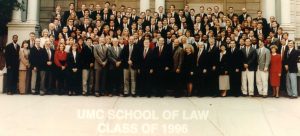
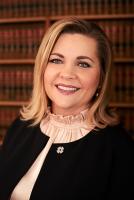 The achievements of the women of the Mizzou Law class of 1996 have shone brightly this year:
The achievements of the women of the Mizzou Law class of 1996 have shone brightly this year:
Kelly Broniec earned a Missouri Supreme Court appointment in 2023 making her one of six Mizzou Law alumni on the Missouri Supreme Court. Her appointment also contributed to making the Missouri Supreme Court a majority female bench. Additionally, Megan Phillips was elected president of the Missouri Bar Association, and many others continue to succeed in new and existing roles.
Almost as admirable as their career trajectories is the strong bond many of these women have built and maintained in the nearly 30 years since beginning law school. Here are some of the stories of those who graduated in the 1996 calendar year.
 Megan Phillips, President of the Missouri Bar
Megan Phillips, President of the Missouri Bar
Megan Phillips had always toyed with the idea of becoming a lawyer, but it wasn’t until her undergraduate experience at the University of Missouri sparked her passion for women’s rights that she decided to pursue a legal education.
After graduating with degrees in sociology and educational and counseling psychology, Phillips took a year to travel internationally — but her return stateside, and to law school, wasn’t a smooth transition, as law school proved to be challenging for her.
“My heart was still in France,” she explained.
But the community she created and the political events of the ‘90s kept her going. Though she was technically a part of the class of ‘97, Phillips wound up graduating a semester early, in December 1996.
“I enjoyed the people,” she said. “The faculty and staff were incredibly accessible and supportive,” she added.
“The deans, faculty, adjuncts and staff came to work every day committed to helping us succeed.”
Phillips still keeps in touch with many of her classmates and works with Mizzou alumni often in her role with the Missouri Bar.
“It’s one of the best parts of the job,” she said.
Phillips said she has Mizzou Law to thank for many of the hard skills she uses as an attorney like research, writing and critical thinking — but also some of the soft skills that have played a role in her career.
“Mizzou Law School is a place where professionalism meets humanity,” she said.
 Jill Morris, United States Magistrate Judge
Jill Morris, United States Magistrate Judge
Jill Morris also traveled abroad in France before returning to Mizzou Law as a Ross T. Roberts Scholar. For Morris, deciding to return to Missouri’s flagship campus for law school was a natural progression.
“I anticipated practicing law in Missouri and enjoyed my undergraduate experience in Columbia,” she said. “So a law degree from the state’s flagship campus made sense.”
Now, almost 30 years into her career, Morris serves as a federal magistrate judge for the U.S. District Court for the Western District of Missouri — the same district court where her scholarship’s namesake, Judge Ross Roberts, served from 1982 to 1987. It’s also the same district court where she clerked in 1996 for former MU law professor, the Honorable Nanette K. Laughrey, who was appointed that year as the first female Article III judge in the court.
Some of the experiences Morris enjoyed most during her time as a law student were the clinical opportunities offered, including the domestic violence clinic and prosecution clinic.
“These clinics provided the best practical foundation for later practicing law,” she said.
She also cited the mentorship of professors, attorneys, and jurists as one reason for her and her classmates’ successes.
“Perhaps we were fortunate to have so many incredible women rise in corporations, law firms, the judiciary, non-profits, educational institutions, in-house and the like because of the era in which many of us were raised, and the important examples set by many women and others ahead of us,” she reflected.
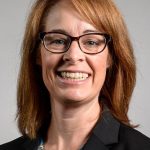 Marsha Fischer, Vice President of Human Resources, University of Missouri
Marsha Fischer, Vice President of Human Resources, University of Missouri
Though Marsha Fischer spent time as both a law student and an attorney at the University of Missouri, her journey to law school began in southwest Missouri, where she grew up and later attended Missouri State University.
Fischer clerked for Judge Scott O. Wright immediately out of law school and then practiced law in Columbia for 16 years before her upbringing and experiences as both an undergraduate and a law student contributed to her decision to return to MU as an attorney.
“I love public education,” Fischer said. “I would say the quality of public education I received is one of the reasons I feel so passionate about it… I came from a small town, and by working hard in undergrad and then law school, that helped me to have a good career. And isn’t that what we want for everyone?”
Like Phillips, one of the things she remembers about her time as a law student was the sense of community at the school. She considers some of her classmates as her closest friends, and they still get together on a regular basis.
Fischer also credited faculty mentorship as one of the things that helped her build a successful career — she recalled learning much from her relationships with professors and mentors. She credits her adviser Dean Bob Bailey as being a mentor to her throughout her career.
“He is someone I consulted before every career change.”
She also remembers the mentorship of some of her female professors like Judge Nanette Laughrey, Michelle Cecil and Candace Johnson.
“They would talk to us about just being a female in the profession, about balancing work and family,” Fischer said. “They were role models … they helped us navigate those types of issues.”
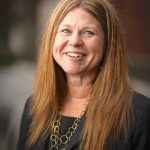 Paula Schaefer, University of Tennessee Law Professor
Paula Schaefer, University of Tennessee Law Professor
In fall 2023, Professor Paula Schaefer showed some of her University of Tennessee 1L students a photo of herself and some of her classmates from the class of 1996. They had just met up for a reunion—marking 30 years since their 1L year.
After discussing her friends’ career paths, she told her students, “The lesson is not to find a role model like one of my friends and follow their path. The lesson is that in 30 years, everyone finds their own definition of success.”
Of her law school friendships, Schaefer says, “Those friendships helped me survive law school and have been so important to me through the years.”
Schaefer’s interest in academia was also sparked during her time at Mizzou Law, where outside of spending time with friends and classmates, she worked on the law review and served as a teaching assistant to professor Melody Daily.
“These experiences helped me start to understand how legal scholarship can influence the law and be useful to lawyers,” she said. “(They) planted a seed that I might enjoy being a law professor someday.”
Though Schaefer now teaches Civil Procedure and Professional Responsibility at the University of Tennessee in Knoxville, Schaefer has stayed in touch with her law school classmates — and stayed true to her “Missouri roots.”
“I always have a multiple choice question with a Carl Esbeck character in my Civil Procedure final exam,” she joked, referencing the professor emeritus who taught Civil Procedure during her time as a law student.
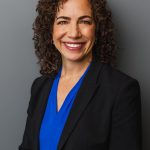 Jackie Mesa, COO and Senior Vice President of Global Policy, Futures Industry Association
Jackie Mesa, COO and Senior Vice President of Global Policy, Futures Industry Association
During her senior year of college at Rhodes College in Memphis, Tennessee, Jackie Mesa made the decision to go to law school in the hopes of practicing international law.
After about eight years of practice, that dream came true when Mesa joined the U.S. Commodity Futures Trading Commission as a trial attorney. That position sparked a nearly 24-year career in finance law, but Mesa can still trace some of her skills back to her experiences as a law student.
“The first week of class, Professor, now Judge Laughrey called on me to answer a question from our (Civil Procedure) reading,” she recalled. “I broke out in a sweat and I will never forget (now) Missouri Supreme Court Judge Brent Powell, who was sitting next to me, trying to tell me the answer. All I heard was nonsense due to my nerves and was incapable of answering.”
After that experience, Mesa “was prepared for the random calling,” and ended up becoming a skilled orator — a talent that she has continued to use in her career.
“Speaking clearly and in a persuasive manner helped me articulate the U.S. position and win some of those debates with my foreign counterparts,” she said. “I now use that skill in frequent public speaking engagements on international financial policy matters.”
Despite the challenges, Mesa described several fond memories, including a legislative push by students to get state support for the school’s domestic violence clinic.
“I felt there was something special about the class of ’96 while I was in law school,” she said. “Perhaps all classes feel this way but it was an incredibly kind but driven group of students. The bar was raised for us in law school and peers were forced to meet and exceed that bar. It does not surprise me that our class has so many accomplished individuals.”